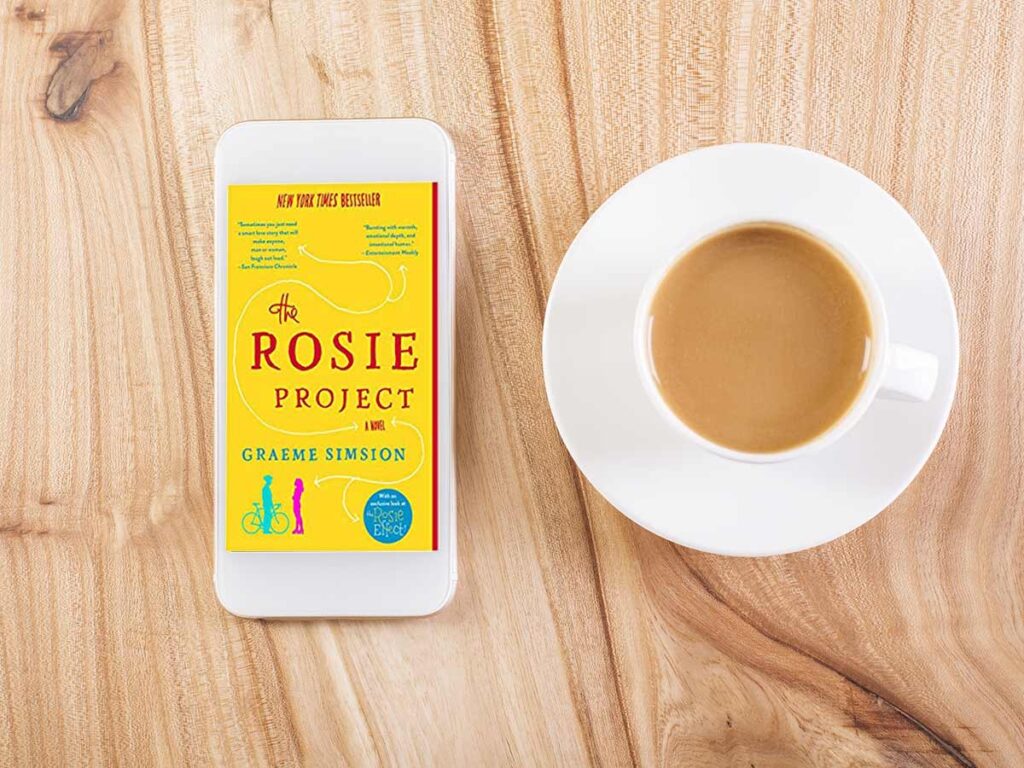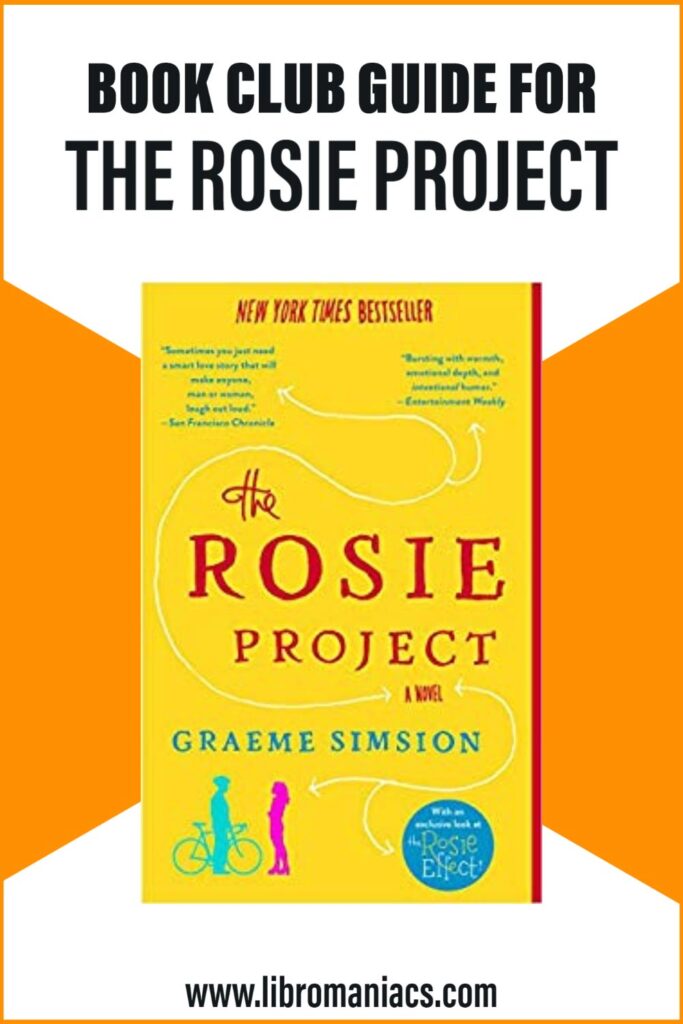The Rosie Project is a delightful, romantic novel about a genetics professor’s search for love. The book is funny, charming story full of twists and lovable characters…which is why it’s such a fun book club pick! Use our book club questions for The Rosie Project to get the conversation started.
Don Tillman is an endearing but rigid man who devises the “Wife Project” to turn romance into a scientific process, which even includes a questionnaire to calculate compatibility. When he meets Rosie Jarman, a beautiful Ph.D. candidate, and believes she is part of the Project, he quickly determines they’re incompatible. Despite this, their relationship leads him towards change, adventure, and love.
Much of the book’s humor and appeal comes from its dramatic irony. With Don as the narrator, readers can see the world as he does while noticing cues he misses. It provides insight into the mindset of someone with Asperger’s Syndrome, the opportunity to learn from Don’s engaging prose and perspective, and keeps us hooked and optimistic for the couple.
This discussion guide for The Rosie Project includes 10 book club questions, a synopsis, some discussion-worthy reviews, and some fun read-alikes.

(This article contains affiliate links. This means that if you choose to purchase, I’ll make a small commission.)
The Rosie Project Synopsis
The Rosie Project, Graeme Simsion
The art of love is never a science: Meet Don Tillman, a brilliant yet socially inept professor of genetics, who’s decided it’s time he found a wife. In the orderly, evidence-based manner with which Don approaches all things, he designs the Wife Project to find his perfect partner: a sixteen-page, scientifically valid survey to filter out the drinkers, the smokers, the late arrivers.
Rosie Jarman possesses all these qualities. Don easily disqualifies her as a candidate for The Wife Project (even if she is “quite intelligent for a barmaid”). But Don is intrigued by Rosie’s own quest to identify her biological father. When an unlikely relationship develops as they collaborate on The Father Project, Don is forced to confront the spontaneous whirlwind that is Rosie―and the realization that, despite your best scientific efforts, you don’t find love, it finds you.
10 The Rosie Project Book Club Questions
- How did you relate to Don’s worldview? What did you learn from his quest for efficiency and self-improvement?
- Don’s friends believe that he has Asperger’s Syndrome. But he seems to be unaware of it. What do you think? Does the book capture his condition in a loving and compassionate manner?
- Consider how people treat Don? Do Gene and Rosie treat him differently than others do? What did you want them to do differently? What would you do in their place?
- Don says, “Fortunately I am accustomed to creating amusement inadvertently when his students laugh at him.” He also talks about how, for the socially awkward, visiting a restaurant is a minefield.
Do these comments speak more to self-awareness or to the experience of being mocked? Is there an overlap between the book’s comedy and its sincerity? - Don considers Rosie a wholly incompatible romantic prospect. She’s impulsive, often late, and doesn’t cook. Is he correct? What do Rosie and Don have in common?
- “I haven’t changed my mind. That’s the point! I want to spend my life with you even though it’s totally irrational. And you have short earlobes. Socially and genetically there’s no reason for me to be attracted to you. The only logical conclusion is that I must be in love with you.”
How important is compatibility in a relationship? How important is flexibility? What else was at play in Rosie and Don’s relationship?
- The novel repeats the notion that “Humans often fail to see what is close to them and obvious to others.” How often is this true in romantic and familial relationships? What can we learn from the idea?
- Were you surprised by the revelation of Rosie’s biological father? As you read the book, who did you think he was?
- What has changed about each character by the end of the book? Have they grown? What have they learned from each other? Did you find it hopeful?
- What has the book taught you? About relationships, patience, or love? What will you take away from it the most?
Reviews:
“[Rosie is] too trite and quirky to be believable. Don himself is simply a figure of fun, he moves from scene to scene for our amusement in a “what will he do now?” manner as Julia Roberts did in Pretty Woman. The book groans plot wise, nothing is surprising and though it is an easy read it is an utterly underwhelming one.”
“What a shame that the opportunity to educate and illuminate was squandered and traded for gratuitous laughs, extreme generalizations and blatant stereotyping.”
“The protagonist Don is definitely a clichéd version of someone with Asperger’s, but I think he had to be for the purposes of the novel […] I cringed at the end of the book when he is struggling about whether he feels love or not. Not accurate for someone with Asperger’s – they actually have intense emotions but are unable to express them very well. But the author redeems himself by communicating that in the end and adds a very insightful point which is that perhaps Rosie needs to also be more accepting and not expect Don to change his core being.”
“How addictive was this book? It’s a fun, quirky and erudite love story. It’s laugh-out-loud funny and unexpectedly touching. Don is a wonderfully offbeat narrative character and Rosie is his perfect foil. Graeme Simsion writes both characters pitch perfect. I think one of the reasons the story is so appealing is that it’s written by a man, from a man’s perspective. And it’s definitely not lad lit.”
“I loved the ways [Don] measured and evaluated life. I want to embrace his rigid meal plan and have lobster in my bathtub every Tuesday night. And I laughed! […] Don is obviously bordering on being dysfunctional in life and yet, his idiosyncrasies started to make sense to me. I found myself agreeing with his practical approach many times.”
Recommended Related Books
If you like Moyes, then try her newer book Someone Else’s Shoes, and use our Someone Else’s Shoes discussion guide.
If you like an Australian setting, we have a whole list of books set in Australia to feed your TBR list. And if you want more romance, we’ve also got a book club guide for Emily Henry’s Book Lovers and People We Meet on Vacation.

Eleanor Oliphant is Completely Fine, Gail Honeyman
Eleanor Oliphant is Completely Fine is for anyone who loves romantic books with interesting, complex characters. Eleanor Oliphant is a solitary, intelligent, and mistreated woman who insists she is “completely fine.” Spoiler alert: she’s not fine!
Eleanor’s awkward social interactions and misunderstandings result from past trauma and the unkindness of people around her. When she and a new colleague save an elderly man’s life, things begin to change. The challenging but hopeful book explores themes of isolation, intimacy, and trauma while advocating sympathetically for warmth and understanding.
Read it for book club and use our discussion guide for Eleanor Oliphant. And if you’ve already read and loved this one, we’ve also got a list of books like Eleanor Oliphant is Completely Fine.

The Hating Game, Sally Thorne
If you love funny, romantic books about the potential for opposites to attract, The Hating Game is for you. Sweet, charming Lucy Hutton works for a publishing company alongside Joshua Templeman, her intimidating, cold nemesis. The pair are constantly at odds, fighting their personal and professional battles through different ‘games’. Their conflict and confusion create tension, humor, and romance in this thrilling, funny novel.

The Curious Incident of the Dog in the Nighttime, Mark Haddon
If you liked Don’s character and are interested in exploring more characters on the spectrum, then try this book. It’s a mystery novel narrated in the first person by fifteen-year-old Christopher John Francis Boone.
Christopher is falsely accused of perpetrating–and subsequently investigates–the death of his neighbor’s dog. It’s a darker, less comedic book than Rosie, and the differences between Don and Christopher emphasize there isn’t a single perspective or shared experience among people with Asperger’s Syndrome. However, The Rosie Project was partially inspired by The Curious Incident, and what the novels share is an empathic perspective on being an outsider, complex narratives, and enthralling twists.
Have a listen on Audible. Try audio books for free for 30 days.
Share these The Rosie Project book club questions with your friends:

